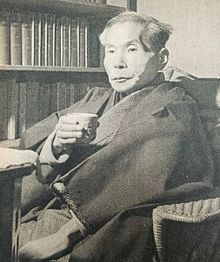Rofū Miki
| Rofū Miki | |
|---|---|
 |
|
| Native name | 木操操 |
| Born |
June 23, 1889 Tatsuno |
| Died | December 29, 1964 (aged 75) |
| Occupation | Writer, poet |
| Language | Japanese |
| Nationality | Japanese |
| Education | Waseda University, Keiō University |
| Notable awards | Order of the Holy Sepulchre, Japanese Medal of Honor, Order of the Sacred Treasure |
Masao Miki (Japanese: 三木 操 Hepburn: Miki Masao?) (23 June 1889 – 29 December 1964), better known by his pen name Rofū Miki (三木 露風 Miki Rofū?), was a Japanese poet, children's book author and essayist. He is considered a significant representative of Japanese symbolism.
Miki was born in Tatsuno in Hyōgo Prefecture in 1889, the oldest son of Setsujirō Miki and Kata Midorikawa (1869–1962). Midorikawa married at 15, and was a nurse and a significant figure in the women's movement of the Meiji period. He had one brother, Tsutomu. After the divorce of his parents in 1895 when he was 5 years old, Miki grew up with his grandfather. He attended elementary and middle school in Tatsuno and wrote poems, haiku and tankas as a student.
At the age of 17, he published his first collection of poems, and at 20 his poetry collection Haien, which received attention at the time for its free verse. Miki was regarded as an early talent and he gained attention along with Hakushū Kitahara, to whom he has been compared in style and stature.
He studied literature at Waseda University and Keiō University. Around 1918, he joined Miekichi Suzuki's recently founded children's literature magazine Akai tori (赤い鳥, "Red Bird"), to which he contributed work, participating in the magazine's new movement to create high-quality, beautiful and emotional children's verses and songs, called dōyō.
...
Wikipedia
